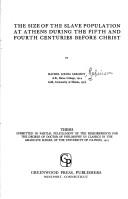| Listing 1 - 10 of 432 | << page >> |
Sort by
|
Book
ISBN: 9780230004603 0230004601 Year: 2012 Volume: *15 Publisher: Basingstoke : Palgrave Macmillan,
Abstract | Keywords | Export | Availability | Bookmark
 Loading...
Loading...Choose an application
- Reference Manager
- EndNote
- RefWorks (Direct export to RefWorks)
"This new study provides an up-to-date survey of social and economic developments in early modern Eastern European rural societies. Markus Cerman revises the traditional images of mighty lords and poor, powerless 'serf peasants', discussing the theories which led to the assumption that serfdom existed throughout the region. Cerman contrasts the interpretation of a long-term backwardness with a fresh view of the legal, social and economic status of villagers, their living standards and their role in actively shaping rural communities. Featuring helpful tables, a glossary and a comprehensive bibliography, this is a stimulating reassessment for anyone studying this period and often neglected topic in European history."--Publisher's website.
Serfdom --- Europe, Eastern --- Economic conditions. --- Social conditions. --- Civilization. --- Servitude --- Forced labor --- Land tenure --- Slavery --- Villeinage --- Law and legislation
Book
ISBN: 8878855952 8878855928 8878855774 Year: 2018 Publisher: Torino : Rosenberg & Sellier,
Abstract | Keywords | Export | Availability | Bookmark
 Loading...
Loading...Choose an application
- Reference Manager
- EndNote
- RefWorks (Direct export to RefWorks)
Perché le persone scelgono di vivere in situazioni che esse stesse valutano negativamente e che provocano loro disagio e sofferenza? Perché accettano le regole e i comandi dettati da soggetti e organizzazioni con cui non sono in sintonia, e che spesso disprezzano? In breve: perché le persone si rassegnano e obbediscono, anche quando non vorrebbero? Di fronte a questa domanda, il libro argomenta che ognuno affronta sempre soltanto i problemi che crede di poter risolvere. I modi con cui immaginiamo il mondo plasmano i valori e le preferenze, i vincoli e le aspettative che orientano le nostre azioni. Sono i modelli mentali (gli schemi interpretativi del mondo), le credenze collettive (le convinzioni su com’è fatto il mondo) e le identità sociali (le convinzioni su chi siamo nel mondo) a determinare le nostre scelte. Quando smarriamo il significato delle nostre attività e della nostra presenza nel mondo, inventiamo futuri possibili, per meglio vivere in una società nella quale quei mondi inventati hanno efficacia. Tuttavia, se immaginare mondi è lo strumento fondamentale con cui interveniamo su noi stessi e sul contesto, non tutte le simulazioni sono uguali. Alcune reificano i processi sociali e riproducono le asimmetrie di potere, assegnando a qualcuno la responsabilità del cambiamento; altre si aprono a progettualità inclusive ed egualitarie. È sul terreno conflittuale delle immaginazioni del futuro che si gioca la possibilità di sradicare la servitù volontaria.
Social psychology. --- Mass psychology --- Psychology, Social --- Human ecology --- Psychology --- Social groups --- Sociology --- politics --- voluntary servitude --- future --- fictional --- economy --- possible future
Book
ISBN: 110859459X 1108687482 1108482414 110859560X 1108712274 Year: 2019 Publisher: Cambridge : Cambridge University Press,
Abstract | Keywords | Export | Availability | Bookmark
 Loading...
Loading...Choose an application
- Reference Manager
- EndNote
- RefWorks (Direct export to RefWorks)
Jan Breman takes dispossession as his central theme in this ambitious analysis of labour bondage in India's changing political economy from 1962 to 2017. When, in a remote past, tribal and low-caste communities were attached to landowning households, their lack of freedom was framed as subsistence-oriented dependency. Breman argues that with colonial rule came the intrusion of capitalism into India's agrarian economy, leading to a decline in the idea of patronage in the relationship between bonded labour and landowner. Instead, servitude was reshaped as indebtedness. As labour became transformed into a commodity, peasant workers were increasingly pushed out of agriculture and the village but remained adrift in the wider economy. This footloose workforce is subjected to exploitation when their labour power is required and is left in a state of exclusion when it is surplus to demand. The outcome is progressive inequality that is thoroughly capitalist in nature.
Peonage --- Labor policy --- Working poor --- Capitalism --- Market economy --- Economics --- Profit --- Capital --- Poor --- Working class --- Labor --- State and labor --- Economic policy --- Bonded labor --- Debt, Servitude for --- Debt bondage --- Debt slavery --- Servitude --- Servitude for debt --- Contract labor --- Forced labor --- History. --- Employment --- Government policy
Book
ISBN: 8175967463 8175968869 9788175968868 9788175967465 Year: 2011 Publisher: New Delhi Foundation Books
Abstract | Keywords | Export | Availability | Bookmark
 Loading...
Loading...Choose an application
- Reference Manager
- EndNote
- RefWorks (Direct export to RefWorks)
Human Rights and Law: Bonded Labour in India deals with the problem of debt bondage and the way it has been treated during the British as well as in the post-independence period. Analysis has been made of the motivations for carrying out the reform; the processes involved in formulating the legislation, contributions by different agencies, discussion in the parliament, etc. The two legislations: the Indian Slavery Act, 1843 and bonded labour system (Abolition) Act, 1976 provide a comparative perspective in the making of social legislation in two different historical settings and different political systems.
Forced labor --- Human rights --- Peonage --- Law - Non-U.S. --- Law, Politics & Government --- Law - Africa, Asia, Pacific & Antarctica --- Basic rights --- Civil rights (International law) --- Rights, Human --- Rights of man --- Human security --- Transitional justice --- Truth commissions --- Compulsory labor --- Conscript labor --- Labor, Compulsory --- Labor, Forced --- Employees --- Bonded labor --- Debt, Servitude for --- Debt bondage --- Debt slavery --- Servitude --- Servitude for debt --- Contract labor --- Law and legislation --- History. --- History --- E-books
Book
ISBN: 9783839437339 3839437334 3837637336 9783837637335 Year: 2016 Publisher: Bielefeld, Germany transcript Verlag
Abstract | Keywords | Export | Availability | Bookmark
 Loading...
Loading...Choose an application
- Reference Manager
- EndNote
- RefWorks (Direct export to RefWorks)
Parallel to the abolition of Atlantic slavery, new forms of indentured labour stilled global capitalism's need for cheap, disposable labour. The famous 'coolie trade' - mainly Asian labourers transferred to French and British islands in the Indian Ocean, Australia, Indonesia, South Africa, the Caribbean, the Americas, as well as to Portuguese colonies in Africa - was one of the largest migration movements in global history. Indentured contract workers are perhaps the most revealing example of bonded labour in the grey area between the poles of chattel slavery and 'free' wage labour. This interdisciplinary volume addresses historically and regionally specific cases of bonded labour relations from the 18th century to sponsorship systems in the Arab Gulf States today. »Dies ist ein wichtiges Buch, nicht nur für Migrationsforscher und Wirtschaftshistoriker, sondern für alle, die sich mit ökonomischen, sozialen und politischen Zusammenhängen im Kontext einer aktuellen Kapitalismusforschung auseinandersetzen. Das Buch wird nachdrücklich empfohlen.« Hermann Mückler, Mitteilungen der Anthropologischen Gesellschaft in Wien, 147 (2017)
E-books --- Peonage --- Forced labor --- Slave labor --- Labor contract --- Labor policy --- Indentured servants --- History --- Forced labor. --- Compulsory labor --- Conscript labor --- Labor, Compulsory --- Labor, Forced --- Employees --- Colonialism. --- Culture. --- Ethnology. --- Global History. --- Globalization. --- History of Colonialism. --- History. --- Migration. --- Postcolonialism. --- Social History. --- Work. --- Labour; Colonialism; Migration; History; Culture; Globalization; Postcolonialism; Work; Global History; History of Colonialism; Social History; Ethnology --- Bonded labor --- Debt, Servitude for --- Debt bondage --- Debt slavery --- Servitude --- Servitude for debt --- Contract labor
Book
ISBN: 9062650708 9789062650705 9789062650705 Year: 1980 Publisher: Haarlem : In de Knipscheer,
Abstract | Keywords | Export | Availability | Bookmark
 Loading...
Loading...Choose an application
- Reference Manager
- EndNote
- RefWorks (Direct export to RefWorks)
Dutch translation of the famous Discours de la Servitude Volontaire of Etienne de la Boétie, first published in 1577, a classic on civil disobedience and nonviolence avant-la-lettre in order to combat slavery and oppression. A comment on Etienne de la Boétie is given in annex by A.L. Constandse.

Abstract | Keywords | Export | Availability | Bookmark
 Loading...
Loading...Choose an application
- Reference Manager
- EndNote
- RefWorks (Direct export to RefWorks)
Serfdom --- -34 <09> --- Servitude --- Forced labor --- Land tenure --- Slavery --- Villeinage --- History --- Rechtsgeschiedenis --(algemeen) --- Law and legislation --- History. --- 34 <09> Rechtsgeschiedenis --(algemeen) --- 34 <09> --- Germany
Book
ISBN: 0236400843 Year: 1977 Publisher: London : P. Elek,
Abstract | Keywords | Export | Availability | Bookmark
 Loading...
Loading...Choose an application
- Reference Manager
- EndNote
- RefWorks (Direct export to RefWorks)
Slavery --- -Abolition of slavery --- Antislavery --- Enslavement --- Mui tsai --- Ownership of slaves --- Servitude --- Slave keeping --- Slave system --- Slaveholding --- Thralldom --- Crimes against humanity --- Serfdom --- Slaveholders --- Slaves --- -Slavery
Book
ISBN: 3515018786 9783515018784 Year: 1975 Volume: 6 Publisher: Wiesbaden : Franz Steiner,
Abstract | Keywords | Export | Availability | Bookmark
 Loading...
Loading...Choose an application
- Reference Manager
- EndNote
- RefWorks (Direct export to RefWorks)
Slavery --- Esclavage --- -Abolition of slavery --- Antislavery --- Enslavement --- Mui tsai --- Ownership of slaves --- Servitude --- Slave keeping --- Slave system --- Slaveholding --- Thralldom --- Crimes against humanity --- Serfdom --- Slaveholders --- Slaves --- -Slavery --- Slavery - Greece

ISBN: 0837170346 9780837170343 Year: 1973 Publisher: Westport : Greenwood Press,
Abstract | Keywords | Export | Availability | Bookmark
 Loading...
Loading...Choose an application
- Reference Manager
- EndNote
- RefWorks (Direct export to RefWorks)
Slavery --- -Abolition of slavery --- Antislavery --- Enslavement --- Mui tsai --- Ownership of slaves --- Servitude --- Slave keeping --- Slave system --- Slaveholding --- Thralldom --- Crimes against humanity --- Serfdom --- Slaveholders --- Slaves --- -Slavery --- Slavery - Greece
| Listing 1 - 10 of 432 | << page >> |
Sort by
|

 Search
Search Feedback
Feedback About UniCat
About UniCat  Help
Help News
News